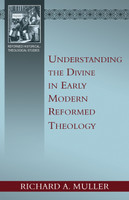Description
An intriguing book, quite unlike any other The Marrow of Modern Divinity defies pigeon–holing. It was written in the 1600s by an author of whom we know little, yet it proved to be a critically important and controversial theological text.
Penned as dialogue between a minister (Evangelista), a young Christian (Neophytus), a legalist (Nomista) who believes Christianity is a set of rules to be obeyed and Antinomista who thinks it’s okay to sin because God will forgive him anyway, it makes for a wonderfully insightful book that remains tremendously relevant for our world today.
This eagerly awaited edition includes explanatory notes by the famous puritan Thomas Boston, an introduction by Philip Ryken and an historical introduction by William Vandoodewaard.
Endorsements
"The Marrow emphasizes biblical, evangelical doctrines such as the sovereignty of God in the covenant of grace, the free offer of the gospel, assurance in Christ as the essence of faith, and sanctification by grace rather than by the law."
—Philip G. Ryken, President, Wheaton College, Wheaton, Illinois
"Anyone who comes to grips with the issues raised in The Marrow of Modern Divinity will almost certainly grow by leaps and bounds in understanding three things: the grace of God, the Christian life, and the very nature of the gospel itself. I personally owe it a huge debt."
—Sinclair B. Ferguson, Ligonier Ministries teaching fellow and Chancellor’s Professor of Systematic Theology at Reformed Theological Seminary
"The Marrow of Modern Divinity is one of the most important theological texts of all time."
—Derek W.H. Thomas, originally from Wales, was the Senior Minister of First Presbyterian Church in Columbia, South Carolina and Chancellor’s Professor of Systematic and Pastoral Theology at Reformed Theological Seminary. He is a Teaching Fellow with Ligonier Ministries.
"Thomas Boston's annotated edition of The Marrow of Modern Divinity is one of the most important texts in the history of Reformed discussions of justification, assurance and ethics. It has a controversial history - as the notes provided by Boston indicate - but that is because the matters on which it touches are so central to understanding both the gospel and the Christian life. This is a book which repays the time spent studying it."
—Carl R. Trueman, Paul Woolley Professor of Historical Theology and Church History, Westminster Theological Seminary, Philadelphia, Pennsylvania






